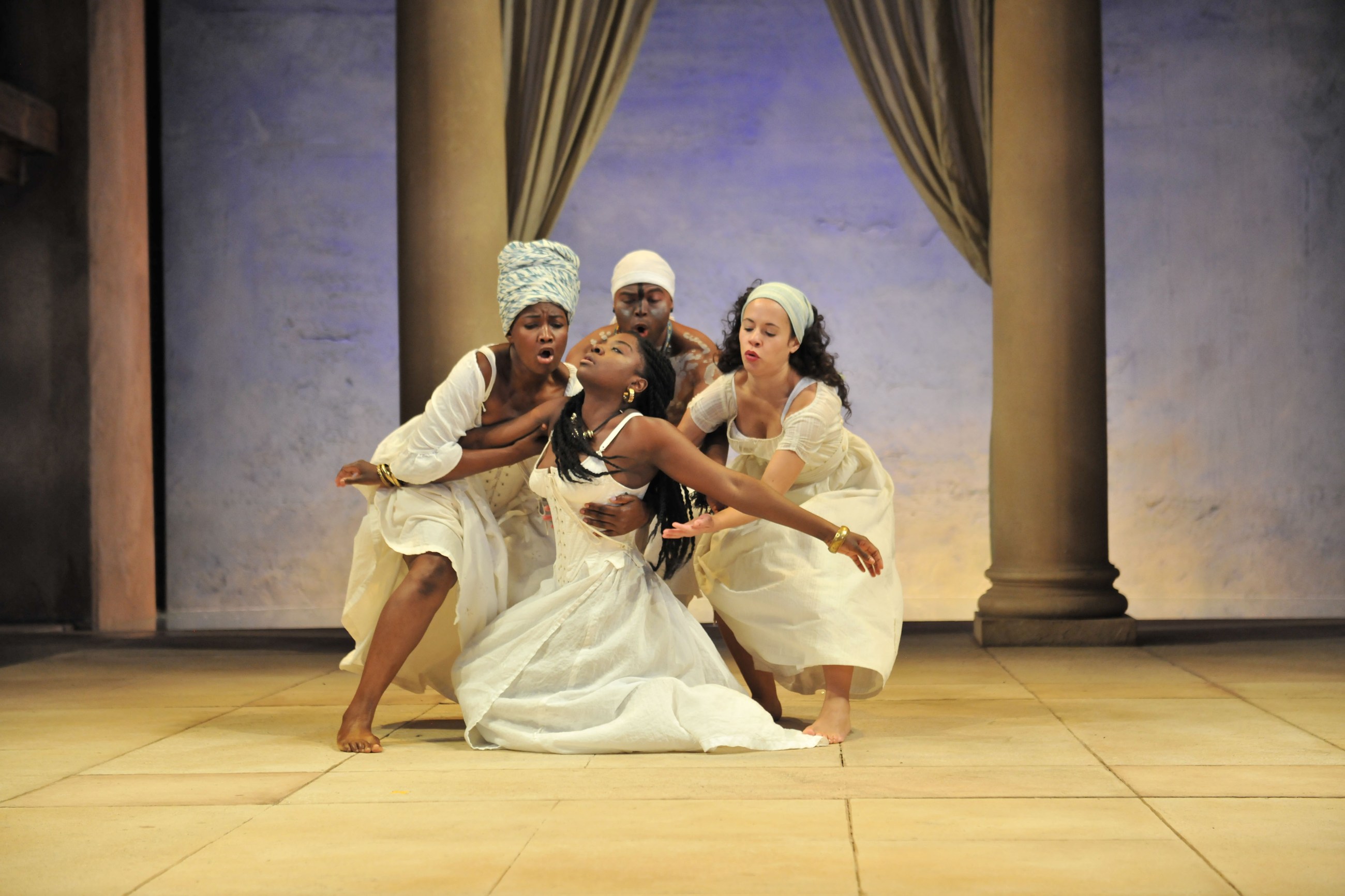
A Caribbean backdrop for ‘Antony and Cleopatra’
Sarah Niles as Chairman, Joaquina Kalukango as Cleopatra, Chivas Michael as Soothsayer and Charise Castro Smith as Iras in Antony and Cleopatra. Photo by Hugo Glendinning.
Last January, Tarell Alvin McCraney’s streamlined version of Shakespeare’s “Hamlet,” considered by some to be the most difficult of the Shakespearean tragedies, debuted under his direction at GableStage in Coral Gables.
This year, the Miami playwright and actor directs his own adaptation of another tragedy of Shakespeare’s, the complex “Antony and Cleopatra.” Tackling the Bard’s work can be daunting for anyone, but McCraney thrives on the challenge.
“Every great piece of literature should be scary, exciting, demanding,” says McCraney a few days before the U.S. opening gala (tonight at the Colony Theatre in Miami Beach) of “Antony and Cleopatra.” “If it were boring, tedious, or easy, it would not be worth one’s time.”
By changing the setting of the play from Alexandria and Rome to Saint-Domingue (the future Haiti) and Napoleonic France, “Antony and Cleopatra” should feel much closer to home for South Florida audiences. For the city’s theatrical community, meanwhile, it could be a watershed moment, as the spotlight focuses on a production with local roots, which will eventually move to New York after its Miami run.
“This is something we’ve been working on for a couple of years,” says Joseph Adler, producing artistic director of GableStage, now in its 16th season. “As this evolved, it became bigger and bigger.”
What began as a proposal to Knight Foundation to fund an outdoor winter Shakespeare festival marketed to students evolved into a grander and more encompassing endeavor once GableStage won a $120,000 grant.
“Tarell had had a previous relationship with the Public [Theater] and the [Royal Shakespeare Company], and of course, with GableStage,” remembers Adler. (The Royal Shakespeare Company had asked McCraney to reinterpret ‘Antony and Cleopatra’ while he was in residence with the company.) “So, putting it together in those three cities seemed like a logical choice for us. And the Knight Foundation really got the ball rolling when they gave us a Knight Arts Challenge grant to get started.”
A theatrical feat for South Florida
Getting started, raising a budget of more than $2 million, working with a 10-member cast from the United States and Britain, and opening in three cities – the production made its international debut in Stratford-upon-Avon in November 2013 – definitely make this a momentous theatrical happening.
“I think this kind of collaboration with two of the world’s great theaters, and our theater, demonstrates that Miami is moving ahead in the theatrical world,” says Adler. “I hope it will be a transformative theatrical event.”
For Tatiana Hernandez, arts program officer for Knight Foundation, transformation is something that many of the players involved seem to have experienced.
“As Tarell has grown as an artist, Miami has grown as a cultural community,” says Hernandez, who oversees the Knight Arts Challenge contest for discovering and fostering arts and creativity in Detroit, Miami and Philadelphia.
“The beauty of Shakespeare is that his work is timeless and universal. We think that the project is so incredibly compelling, and so Miami. And that’s really what the Arts Challenge is about,” Hernandez said. “We are always looking for ideas that are uniquely of a community, and this idea is so uniquely of our community that I can’t imagine this combination happening anywhere else.”
Growing up with the story
The Haitian Revolution was not foreign to McCraney, recipient of a 2013 MacArthur Fellowship (or “Genius Grant”). He was born and raised in Liberty City and graduated from the New World School of the Arts High School.
“I knew it by heart because I grew up in Miami. There were murals of it in my neighborhood. There were streets called Toussaint, there were stores called Louverture, places called Dessalines,” the 33-year-old McCraney recalls, mentioning the names of the leaders of the slave revolt that freed the Haitians from French rule.
“Doing a show in Miami, it felt really important to make sure that we were doing something about the people who live here,” he adds. “But the show is also about colonialism. Even if you don’t know about the Haitian Revolution itself, when you see the trappings of colonialism on stage, the history of it is more evocative for us in America, especially in Miami, than if we present togas and pyramids.”
However, Shakespeare purists shouldn’t despair. His grand themes are still evident – war, suicide, star-crossed lovers, politics, lust, deception, betrayal – but with an immediacy that the original version may not have conveyed as effectively.
“I think this will be by far the finest production of a Shakespearean play in South Florida. I saw it twice in Stratford, so I can vouch for that,” Adler says. “The key to the success of this project is now in the hands of the South Florida audience.”
“Antony and Cleopatra”: Gala opening Jan. 9, 7 p.m. Regular performances: Jan. 10 to Feb. 9, at the Colony Theatre, Lincoln Road, Miami Beach. Performances: Fridays at 8 p.m., Saturdays at 8 p.m., Sundays at 2 p.m. Tickets: www.ticketmaster.com
There will also be free morning performances for Miami-Dade County Public School students. Colony Box Office: 305-434-7091.
More information: gablestage.org, colonytheatremiamibeach.com
Juan Carlos Pérez-Duthie is a Miami-based freelance writer.
Recent Content
-
Artsarticle ·
-
Artsarticle ·
-
Artsarticle ·

